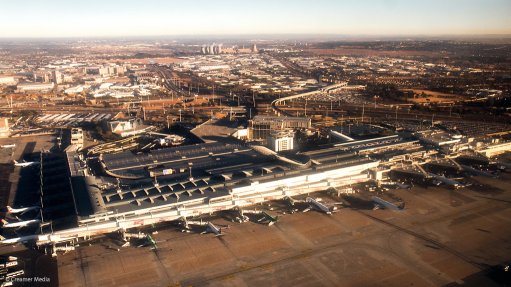
OR Tambo is South Africa’s busiest airport
Photo by: Duane Daws/Creamer Media
The International Air Transport Association (Iata) has forecast that the number of air passenger journeys to, from and within South Africa will more than double from the 23.6-million last year to more than 54-million by 2036. This will be the result of an average annual growth rate in the country’s local and international air travel of 4.3%, significantly above the expected rate of 3.5% for the aggregated global industry.
The forecast was released at a briefing at OR Tambo International Airport, in Kempton Park, east of Johannesburg, on Tuesday. However, Iata regional VP Africa & the Middle East Muhammad Ali Albakri did voice a note of caution. If the South African authorities are “not careful with charges, taxes and fees, these projections could be endangered,” he said.
The 2016 figure of 23.6-million air passenger journeys was some 1.2-million higher than in 2015, an increase of 5.3%. In very sharp contrast, South Africa’s gross domestic product (GDP) rose by only 0.3% in 2016. Iata forecasts that South African economic growth will return to more than 2% in five years.
The association also released a report on the contribution that aviation makes to the South African economy. This includes sustaining about 490 000 jobs (including in the tourism sector) and generating $12-billion, or 3.5%, of the national GDP. Every year some 390 000 aeroplanes take off and land from South Africa’s main airports. The busiest single airport is OR Tambo, through which more than 18.5-million passengers passed in 2014.
“The study confirms the vital role of air transport in facilitating over $10-billion in exports, some $140-billion in foreign direct investment and around $9.2-billion in inbound leisure and business tourism for South Africa,” he observed. “With the country now in a recession it’s time to re-double efforts to promote South Africa as a destination for business, trade and tourism.”
Although South Africa ranks first out of a survey of 37 African countries (conducted among executives at the World Economic Forum) in terms of transport infrastructure, it only ranks seventeenth in terms of air transport industry cost competitiveness (measured in terms of air ticket taxes, value-added tax and airport charges). Regarding visa openness, South Africa occupies nineteenth place.
“Affordable, safe and reliable air transport is crucial to economic growth,” affirmed Albakri. “It promotes skills development and is a catalyst for jobs. We urge the South African government to remove any impediments, including unnecessary red tape and policies that hinder air connectivity and the trade, investment, tourism and job opportunities it facilitates and stimulates.”